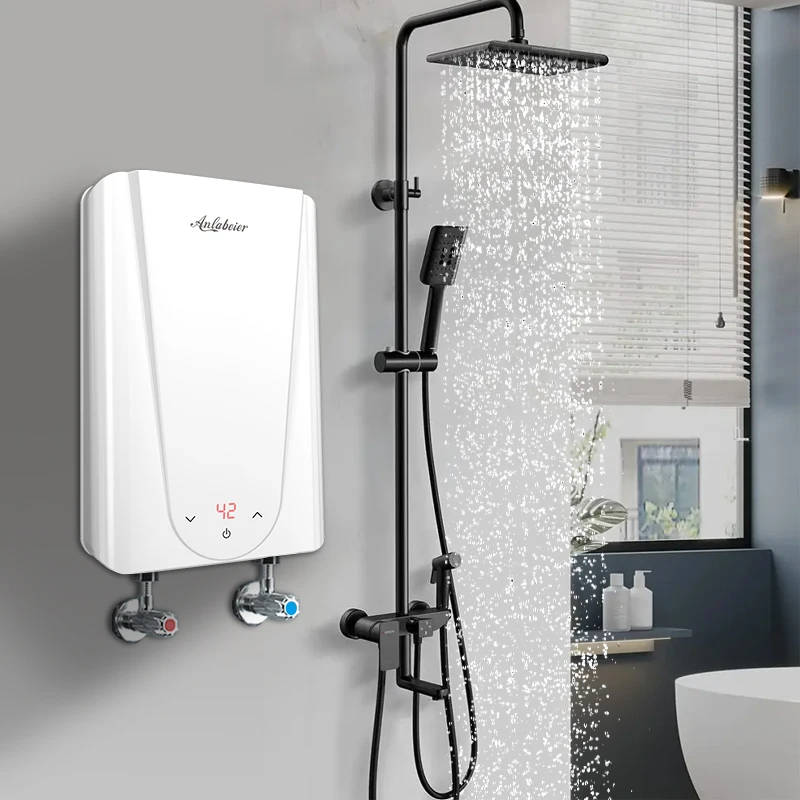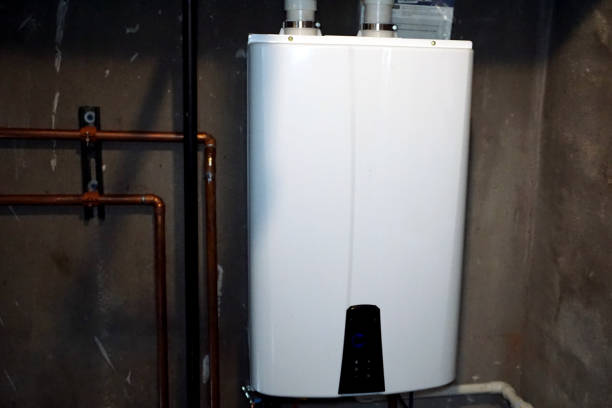Best Factors Why Tankless Water Heaters Become Beneficial
Best Factors Why Tankless Water Heaters Become Beneficial
Blog Article
They are making a number of good points related to Why You Should Consider a Tankless Water Heater as a whole in this great article down the page.

In a globe where comfort and effectiveness reign supreme, it's no surprise that house owners are constantly on the lookout for smarter means to handle their home's power intake and convenience. One technology that has gradually acquired popularity is the tankless hot water heater. But exactly what makes these systems stick out from the traditional tank-based designs the majority of us grew up with? Let's dive in and explore the benefits of tankless hot water heater, helping you make a decision if it's time to make the switch in your home.
Introduction
Image this: you step into the shower after a long day, expecting a calming waterfall of hot water, only to be greeted by icy droplets due to the fact that the last individual utilized all of it up. Sound familiar? Traditional water heaters store a set amount of warm water, meaning you go to the grace of that storage tank's supply. Tankless systems, on the other hand, warm water on demand. Say goodbye to going out mid-shower, no more wrestling with timetables simply to guarantee hot water is available.
Recognizing Tankless Hot Water Heater
What Are Tankless Hot Water Heater?
Tankless water heaters, in some cases called on-demand or instant hot water heater, offer warm water just as it's required. Instead of keeping gallons of pre-heated water, these devices kick right into activity the minute you switch on the tap. Water passes through a heat exchanger, warming up in real-time, implying you get a nonstop circulation of hot water without the need for a big tank sitting lazily by.
How Do They Vary from Standard Equipments?
Conventional heating systems hold a tank of hot water, utilizing power to maintain that tank at a regular temperature. Tankless units eliminate the standing supply, reducing squandered energy and the large footprint of a big cylinder. Essentially, you're updating from a "accumulation" way of thinking to a "made-to-order" method.
Usual Types of Tankless Systems
Tankless water heaters usually are available in 2 ranges: gas and electrical. Gas versions tend to deliver higher flow prices, perfect for bigger families, while electric models commonly serve smaller sized homes and are commonly much easier to mount. Furthermore, some systems are developed for point-of-use (offering one fixture) while others can take care of the entire home's warm water demands.
Key Benefits of Tankless Water Heaters
1. Endless Hot Water Supply
Ever before had to arrange showers so everybody obtains their fair share of hot water? With tankless, that ends up being a thing of the past. As long as the heating unit's flow capability isn't gone beyond, you can take back-to-back showers without becoming a popsicle.
2. Energy Performance and Cost Cost Savings
No more heating up a titan container's worth of water and keeping it toasty throughout the day. Tankless heating units minimize standby power losses, which can reduce utility bills. While the preliminary cost might be higher, the lasting financial savings typically justify the financial investment.
3. Space-Saving Style
If your home is short on storage, removing the cumbersome container liberates useful area. Tankless devices are small and can typically be placed on wall surfaces, tucked away in edges, or mounted in tight energy closets without hogging the entire space.
4. Longer Life-span
A well-kept tankless hot water heater can outlive its tank-based relative. Typical storage tanks may last 10-15 years, while tankless models can keep chugging along for twenty years or more, making them a strong investment in time.
5. Improved Water Quality
Keeping water in a container can sometimes result in debris accumulation or a somewhat "off" preference. With tankless systems, fresh water is heated up on the spot, decreasing the possibilities of sediment build-up and possibly using cleaner-tasting water.
Factors to consider Prior To Changing
Though the advantages are engaging, it's smart to take into consideration a couple of variables before fully dedicating.
Initial Investment Expenses
Tankless heaters generally come with a greater in advance price. In between the system itself and prospective setup modifications, the initial price might give you sticker label shock. However remember to see it as a lasting financial investment.
Installation Needs
Relying on your home's facilities, you might require added electrical capability or gas line upgrades. Ensure you understand the setup needs and consult with a professional to prevent surprises.
Evaluating Your Home's Water Use Patterns
If your house at the same time makes use of multiple fixtures with high warm water need, ensure the system's flow rate meets your demands. Knowing your use patterns assists you pick the right dimension and type of tankless heating unit.
Maintenance and Treatment Tips
Tankless systems are fairly reduced upkeep, but they aren't set-it-and-forget-it devices.
Normal Cleansing and Descaling
Difficult water minerals can develop in the heat exchanger, impacting performance. Normal descaling (frequently suggested every year) maintains the unit going for peak performance.
Annual Professional Examinations
A yearly checkup from an expert guarantees small problems are caught early. They'll analyze the unit's efficiency, search for leakages, and aid maintain optimum efficiency.
Guaranteeing Appropriate Ventilation
For gas designs, correct air flow is vital to safely expel exhaust gases. Make sure venting systems are tidy and properly installed to prevent any type of potential safety and security risks.
Contrasting Different Brands and Designs
Not all tankless water heaters are created equal.
Investigating Dependable Manufacturers
Search for trusted brand names with a history of creating high quality units. A reliable producer commonly gives far better customer support and longer warranties.
Reading Testimonials and Individual Responses
Customer evaluations and comments from next-door neighbors or friends who have gone tankless can use important insights. Occasionally, real-life experiences can be a lot more telling than advertising and marketing sales brochures.
Setup: Do It Yourself or Expert?
While some home owners delight in dealing with tasks themselves, tankless installation could not be the best time to break out the tool kit.
Pros and Cons of DIY Setup
A do it yourself install can conserve money, yet it includes threats. Wrong setup can result in inadequacy or safety and security concerns. If you come in handy and have experience, it might be viable-- yet proceed with caution.
When to Call an Expert Plumbing Technician
For many, calling a pro ensures everything's done correctly. A professional plumbing technician recognizes regional codes, sizing needs, and airing vent specifications, reducing the risk of problems.
Taking full advantage of Effectiveness
You have actually invested in a tankless device-- now maximize its effectiveness.
Ideal Temperature Level Settings
Many people establish their systems between 120-140 F. Adjusting the temperature level can improve convenience and financial savings. Experiment to find a pleasant spot that doesn't throw away power.
Pairing with Low-Flow Fixtures
Intend to stretch your device's abilities? Consider setting up low-flow showerheads and taps. They reduce water usage, enabling your tankless system to provide a consistent stream of hot water without straining.
Environmental Influence
Tankless hot water heater align with greener living objectives.
Lowered Carbon Footprint
By utilizing less power and only home heating water as needed, tankless systems can decrease your home's carbon footprint, minimizing your environmental impact.
Saving Natural Resources
Much less energy consumption and much less thrown away warm water translate right into fewer natural resources being utilized, an ecological win-win.
That Benefits Many from Tankless Heating units?
The charm of tankless heating units is that they can suit a selection of families.
Big Households vs. Single Passengers
Huge family members might like the countless hot water supply, while solitary passengers appreciate the energy savings from not warming an entire container for just one person's early morning shower.
House Owners with Minimal Room
If your home is short on square video footage, shedding the cumbersome tank liberates space for other fundamentals-- or perhaps simply extra breathing space.
Eco-Conscious Consumers
Going tankless aligns with environmentally friendly worths, guaranteeing you're not losing power or sources.
Future Trends in Tankless Hot Water Heater
The globe of home appliances is ever-evolving, and tankless water heaters are no exception.
Smart Home Combination
Think of adjusting your hot water heater's temperature level via an application or receiving upkeep signals on your phone. As smart home technology breakthroughs, we'll see even more connection and benefit.
Improvements in Modern technology
R&D is frequently enhancing heat exchangers, making devices extra effective and long lasting. Future models could be even quieter, much more small, and better fit for differing climates.
Verdict
Picking a tankless hot water heater is more than just upgrading your home's hot water system; it's buying long-term comfort, energy performance, and a greener way of life. By considering your home's water usage, being mindful of installation needs, and dedicating to regular upkeep, you can appreciate a steady stream of hot water without the luggage of a large storage tank. As technology evolves, you can anticipate also smarter, a lot more reliable tankless services that not only make your life much easier however additionally benefit the world.
Pros and Cons of Tankless Water Heaters
Tankless Water Heater Pros
Saves Energy: Simply put, you re spending less energy to create hot water, so your total carbon footprint goes down, not to mention your bills. Lasts Longer Than Storage Tanks: Storage tank units need to be replaced every 15 years or so. But tankless units? They can last for 30 years before they give out on you. Constant Hot Water: Need to take a shower and don t want the water running cold? Awesome it won t. The water will stay hot the entire time because it creates hot water on demand. Saves You Money: Less water usage equals less money. Beyond that, you re not paying to keep water hot 24/7. Those savings add up quickly. Better for the Environment: Less water waste is better for everyone. It saves you money, but it s also environmentally conscious at the same time. Tankless Water Heater Cons
It Can Take a Minute: Depending on your specific unit and its placement, it can take anywhere from 10 seconds to 2 minutes to fully heat up. Because there s no storage tank, it heats water as you need it. Upfront Purchase Price: While we talked about their longevity, there s sticker shock when you look at brand-new tankless units to install. It pays for itself, but it s still a big chunk of change at first. Has its Limits: If you run multiple appliances at once, such as the dishwasher, washing machine, and maybe you take a shower at the same time, there might not be enough hot water. https://www.airsouthnow.com/blog/water-heater-service/pros-and-cons-of-tankless-water-heaters/

I was shown that article on Unveiling the Hot Trend: The Benefits of Tankless Water from a friend on another website. If you please set aside a second to share this post if you liked it. Thanks for going through it.
Call Today Report this page